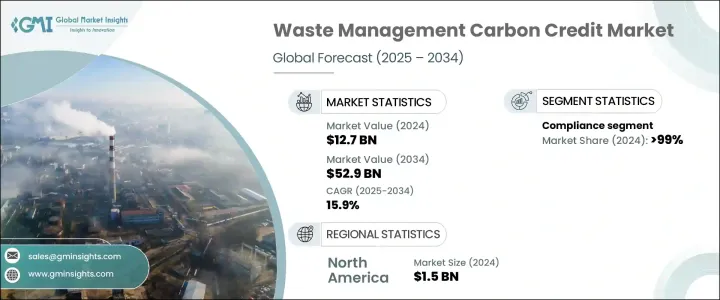PUBLISHER: Global Market Insights Inc. | PRODUCT CODE: 1721560

PUBLISHER: Global Market Insights Inc. | PRODUCT CODE: 1721560
Waste Management Carbon Credit Market Opportunity, Growth Drivers, Industry Trend Analysis, and Forecast 2025 - 2034
The Global Waste Management Carbon Credit Market was valued at USD 12.7 billion in 2024 and is estimated to grow at a CAGR of 15.9% to reach USD 52.9 billion by 2034. As climate change mitigation takes center stage, businesses are increasingly adopting innovative waste management strategies to reduce emissions and earn tradable carbon credits. This market operates within a dynamic financial framework where companies earn credits for lowering, capturing, or redirecting greenhouse gas emissions through structured waste management efforts. These emissions reductions stem from landfill methane capture, waste-to-energy processes, recycling programs, and composting initiatives, all of which contribute to a lower environmental impact and improved sustainability credentials.

Waste management carbon credits have evolved from a niche environmental initiative into a mainstream corporate sustainability strategy. The growing awareness of carbon neutrality goals, coupled with the pressure to align with Environmental, Social, and Governance (ESG) standards, has made these credits an essential component in corporate climate action plans. Organizations are actively investing in projects that convert waste into valuable resources, thereby reducing dependency on traditional disposal methods while generating alternative revenue streams. The synergy between waste reduction and carbon offsetting is creating a win-win situation for both businesses and communities.
| Market Scope | |
|---|---|
| Start Year | 2024 |
| Forecast Year | 2025-2034 |
| Start Value | $12.7 Billion |
| Forecast Value | $52.9 Billion |
| CAGR | 15.9% |
As sustainability becomes a top priority, industries worldwide are leveraging carbon credits to meet their environmental targets. The waste management carbon credit model enables companies to monetize their sustainability practices while adhering to emissions guidelines. These credits can be sold or traded, providing financial incentives for enterprises to reduce their environmental footprints through innovative waste processing techniques. Such efforts are not only enhancing brand value but also opening doors to government funding, subsidies, and favorable stakeholder perceptions.
The market is categorized into voluntary and compliance types, with the compliance segment holding a dominant 99% share in 2024. This overwhelming dominance is attributed to the surge in stringent global environmental and waste recovery regulations. Compliance markets mandate organizations to meet pre-set emission reduction targets either by directly reducing their carbon output or by purchasing carbon credits to compensate for excess emissions. These credits are generated through verifiable projects, including methane capture at landfills and waste-to-energy facilities, which are carefully monitored and validated for impact.
The North America Waste Management Carbon Credit Market was valued at USD 12.7 billion in 2024, with expectations of steady growth driven by heightened emissions regulations and corporate sustainability commitments. With regulatory frameworks becoming more rigorous, industries are increasingly adopting carbon credits as a strategic solution to achieve environmental compliance. In parallel, ESG-focused initiatives are driving investments in carbon offset projects. Companies across sectors are striving to lower their carbon emissions and elevate their sustainability profiles to meet evolving stakeholder expectations.
Key players in the Global Waste Management Carbon Credit Market include ALLCOT, 3Degrees, Atmosfair, Climate Impact Partners, ClimeCo LLC., CarbonClear, EcoAct, Green Mountain Energy Company, Ecosecurities, PwC, Sterling Planet Inc., Suez, South Pole, TerraPass, The Carbon Collective Company, Veolia, The Carbon Trust, and Waste Management, Inc. These companies are enhancing their market presence through strategic partnerships, technological innovation, and collaboration with governmental agencies, environmental NGOs, and private sector entities. Such alliances expand project access and enrich the range of carbon credit solutions available globally.
Table of Contents
Chapter 1 Methodology & Scope
- 1.1 Research design
- 1.1.1 Research approach
- 1.1.2 Data Collection methods
- 1.2 Base estimates & calculations
- 1.2.1 Base year calculations
- 1.2.2 Key trends for market estimation
- 1.3 Forecast model
- 1.4 Primary research and validation
- 1.4.1 Primary sources
- 1.4.2 Data mining sources
- 1.5 Market definitions
Chapter 2 Executive Summary
- 2.1 Industry synopsis, 2021 - 2034
Chapter 3 Waste Management Carbon Credit Industry Insights
- 3.1 Industry ecosystem analysis
- 3.2 Regulatory landscape
- 3.3 Industry impact forces
- 3.3.1 Growth drivers
- 3.3.2 Industry pitfalls & challenges
- 3.4 Growth potential analysis
- 3.5 Porter's analysis
- 3.5.1 Bargaining power of suppliers
- 3.5.2 Bargaining power of buyers
- 3.5.3 Threat of new entrants
- 3.5.4 Threat of substitutes
- 3.6 PESTEL analysis
Chapter 4 Competitive landscape, 2024
- 4.1 Introduction
- 4.2 Strategic dashboard
- 4.3 Innovation & sustainability landscape
Chapter 5 Market Size and Forecast, By Type, 2021 - 2034 (USD Billion)
- 5.1 Key trends
- 5.2 Voluntary
- 5.3 Compliance
Chapter 6 Market Size and Forecast, By Region, 2021 - 2034 (USD Billion)
- 6.1 Key trends
- 6.2 North America
- 6.3 Europe
- 6.4 Asia Pacific
- 6.5 Middle East & Africa
- 6.6 Latin America
Chapter 7 Company Profiles
- 7.1 3Degrees
- 7.2 ALLCOT
- 7.3 Atmosfair
- 7.4 CarbonClear
- 7.5 Climate Impact Partners
- 7.6 ClimeCo LLC.
- 7.7 EcoAct
- 7.8 Ecosecurities
- 7.9 Green Mountain Energy Company
- 7.10 PwC
- 7.11 South Pole
- 7.12 Sterling Planet Inc.
- 7.13 Suez
- 7.14 TerraPass
- 7.15 The Carbon Collective Company
- 7.16 The Carbon Trust
- 7.17 Veolia
- 7.18 Waste Management, Inc.




